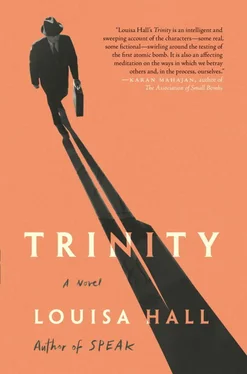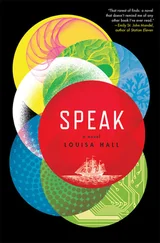It helped, then, to consider my husband. The puzzle of my husband’s nature soothed me in such moments. It seemed to me to be a puzzle that it was possible to complete, or at least a puzzle approaching completion.
Some nights, from New York or Chicago, he called me sounding exuberant and excited, and I laughed at the stories he told of meetings with gallery owners and interested buyers.
Other nights, however, he sounded tired and somewhat removed, as if speaking through a cloth that muffled the receiver.
Other nights still, he didn’t call me at all. Then he’d call early in the morning, sometimes waking me up, apologizing profusely and providing the reasons why it hadn’t been possible for him to call the previous evening, though it hadn’t occurred to me to ask for a reason, and when I picked up I hadn’t been angry.
THERE WERE SIGNS, IN OTHER WORDS, THAT THE PUZZLE I WAS WORKINGon was far from complete. And yet I persisted in ignoring those signs, and took comfort in the exercise, imagining I was making slow but ineluctable progress, so when he called me from Chicago sometime in early October, sounding shaken, and saying in a weird tone of voice that he wanted to come home the next morning, that he missed me and didn’t feel like himself and couldn’t stay away any longer, I accepted his rushed return with a kind of placid, presumptuous pride, and felt a shock that embarrasses me still when, several days later, I picked up the phone and listened while a woman from Chicago related to me the story of her relationship with my husband.
ONCE SHE FINISHED OUTLINING THE STORY, SHE APOLOGIZED FORdisturbing me.
Her voice sounded odd, as if it were slipping over a smooth, icy surface, attempting and failing to find any traction. It had obviously been difficult for her to tell me the details. She said she’d thought very hard about whether to call me, and for a while she’d tried to convince herself that it wasn’t her business, but in the end she felt I should know.
If she’d had any idea, she said, that he had a wife, or that his wife was pregnant, she’d never have gotten involved with him.
But he hadn’t told her. And when he did, she’d ended the relationship.
STANDING IN THE KITCHEN, HOLDING THE RECEIVER, MY FACE FELTvery cold. It seems to me now that I must have encouraged her to keep talking, because why else would she have done so. But I don’t remember actually offering encouragement, and it’s hard for me to believe that I could have spoken clearly during that phone call.
Nevertheless, with or without my encouragement, she told me that she was staying in a hotel downtown. She’d flown to Austin, she said, because she felt it was her responsibility to tell me in person. But once she’d arrived, she’d realized I might not want to see her, and she didn’t want to upset me.
She knew I was pregnant. So she’d decided to call. And if I didn’t want her to keep talking she wouldn’t.
THAT’S HOW IT WENT. SHE WAS VERY POLITE.
It might have been simpler, I think, if she’d been rude or aggressive. If there had been any way for me to channel my anger at my husband toward this woman I didn’t know, a woman who had no real role in my life, I would have happily done it.
But she was so polite on the phone, and so thoughtful. And really, his behavior had given her no choice in the matter of whether or not to intervene in my life, because by the time she learned about my existence and the existence of our still-unborn child, she had already intruded.
Because of my husband’s behavior, in other words, the two of us were already connected. We were already related, whether we wanted to be or not.
And she, too, had been betrayed by my husband. He’d lied to her about having a wife. So by the time she was sitting in a hotel room in Austin, telling me on the phone about how their relationship had developed so quickly and so intensely over the course of the last seven weeks, she was already crying.
It upset her to recall, from this new position, the hopeful moments of their relationship. She’d been so hopeless, she said, since her brother died in Vietnam, but then she met him, and she told me about how she thought they’d get married.
They’d already talked about children. They’d made jokes about the old age they’d spend together. And even outside explicit conversations about a more solid future, a future that was crystallizing before her very eyes, she’d been given hope simply by the fact of his presence. By the hours she spent lying with him in her bed, imagining she’d found a way to be happy, and never suspecting that such hours would be recast so drastically when she discovered that he was already married.
Now, she told me, she could no longer remember those moments as happy. She understood that those happy moments had been invented. Though they had actually happened, her recollection of them had been rendered unreliable by her new understanding that those moments weren’t the early expressions of a still-simple love, but a complicated betrayal that she’d been dragged into.
And now, too late to go back and fix it, she realized she’d participated in the act of turning my happiness into a fiction, just as my existence in Austin had turned her happiness into a fiction, and not even a good fiction, but an embarrassing and tasteless cliché.
STANDING THERE IN THE KITCHEN, I REALIZED THAT HER VOICE BECAMEmore confident as she described these realizations.
She tracked the switchbacks of her thought with that sickening attention to detail that a novelist might provide in a book, detail we rarely note while we’re living real moments and tend to only add later, when we’re belatedly telling the story, when the actual events have passed by and we’re left trying to piece them faithfully back together.
It’s then, when we’re left with nothing more than the shadows of events that have already dematerialized, that we’re compelled to add layers of detail, as if we might give substance to shadows, converting them into the status of objects.
Then I felt my stomach turning to ice. That phone call, that woman, that relationship in Chicago: those weren’t the dangers I’d prepared myself to expect.
OBVIOUSLY I SHOULD HAVE SEEN IT. I KNOW THAT’S WHAT PEOPLEthink. I myself have thought it so often. We imagine people should have foreseen such events when they happen. We judge them for having been blind to the foreshadowing. It comforts us to think that, in their place, we wouldn’t have been so naïve. We would have expected the obvious ending.
But it wasn’t as if I hadn’t considered the potential for danger when I diligently worked at my sketch of my husband. Why work so diligently at such a sketch if you don’t suspect that person might someday evade you?
I’d known, in other words, that something was coming. Only the danger I’d been so strenuously leaving out of the portrait wasn’t that kind of banal betrayal, some sad woman my husband was lying to in Chicago.
No. I’d been distracted from that possibility by my husband’s well-advertised brutality: the pistol he kept in the nightstand, his new reactionary politics, his hand shaking the nape of my neck.
It had been violence I was attempting to cut out of the picture, not this deceit. Not the cultivation of some other life in some other city, into which my husband had occasionally stepped without acknowledging the transition, as if our life in Austin had been temporarily suspended.
As if it had been paused, as you might pause between chapters of a book, setting it aside, leaving it behind for a while. As though I wasn’t fully alive, but existed as a character only as long as he was animating me with his attention, and could be suspended in midsentence as soon as he wasn’t.
Читать дальше












